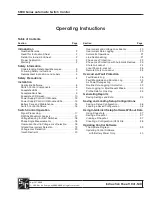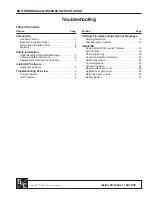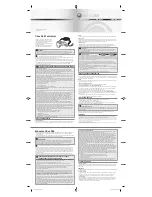
IOM-ALR-1
2
IV. PRINCIPLE OF OPERATION
1. When a loading pressure – P
Load
– is applied to
the top side of a diaphragm, the outlet controlled
pressure – P
2
– will balance at approximately
.90 – .98 of the loading pressure - P
L
.
(NOTE:
Fluc tu a tions in P
1
– Inlet Pressure will cause a
deviation in P
2
– Outlet Pressure due to inverse
sym pa thet ic ratio effect.) See Section VIII.
2. Movement occurs as pressure variations register
on the diaphragm. The registering pressure is the
outlet, P
2
, or downstream pressure. The loading
pressure fluid op pos es di a phragm move ment.
As outlet pres sure drops, the loading pressure
push es the di a phragm down, opening the port; as
outlet pres sure increases, the diaphragm pushes
up and the port opening closes.
3. A diaphragm failure will tend to cause the reg u la tor
to fall below setpoint. A loss of loading pres sure
while inlet pressure is imposed will cause the
regulator to fail close. A com plete diaphragm failure
will cause the inlet process fluid to mix with the
loading fluid.
V. STARTUP
1 Start with the block valves closed.
2. Rotate the adjusting screw of the unloader CCW
three revolutions to decrease the set point pres-
sure of the main regulator.
3. If it is a “hot” piping system, and equipped with
a bypass valve, slowly open the bypass valve
to preheat the system piping and to allow slow
ex pan sion of the piping. Closely monitor outlet
(down stream) pressure via gauge to ensure not
over-pressurizing.
NOTE:
If no bypass valve is
in stalled, extra caution should be used in starting
up a cold system; i.e. do everything slowly.
4. Crack open the outlet (downstream) block valve
to approximately 10% full open.
5. Slowly open the inlet (upstream) block valve to
about 25% open. Rotate the adjusting screw on
the unloader CW to increase the setpoint pres-
sure if necessary until the main valve is flowing.
Observe the outlet pressure gauge to ensure not
over pressurizing.
6. Continue to slowly open the inlet (upstream) block
valve until fully open.
7. Continue to slowly open the outlet (downstream)
block valve, especially when the downstream pip-
ing system isn’t pressurized. If the outlet (down-
stream) pressure exceeds the desired pres sure,
close the inlet block valve and go to Step 2. Close
bypass valve approximately 25%, and re peat
pro ce dure.
SECTION IV
SECTION V
CAUTION
DO NOT HYDROSTATIC TEST THROUGH AN IN STALLED
UNIT; ISOLATE REGULATOR FROM TEST. The "OUTLET
RATING" as printed on the name plate is the rec om mend ed
“upper op er at ing limit” for the sens ing di a phragm. Higher
pres sures could cause internal dam age. In ad di tion, note
on the nameplate that the Inlet and Outlet pres sure and
temperature ratings are at different levels.
CAUTION
Do not walk away and leave a bypassed reg u la tor
unattended!
Model ALR-1 - External Sense
Back Pressure
Unloader & PI
Recommended Piping Schematic
For Pressure Reducing Station
Auxiliary Air Supply



































